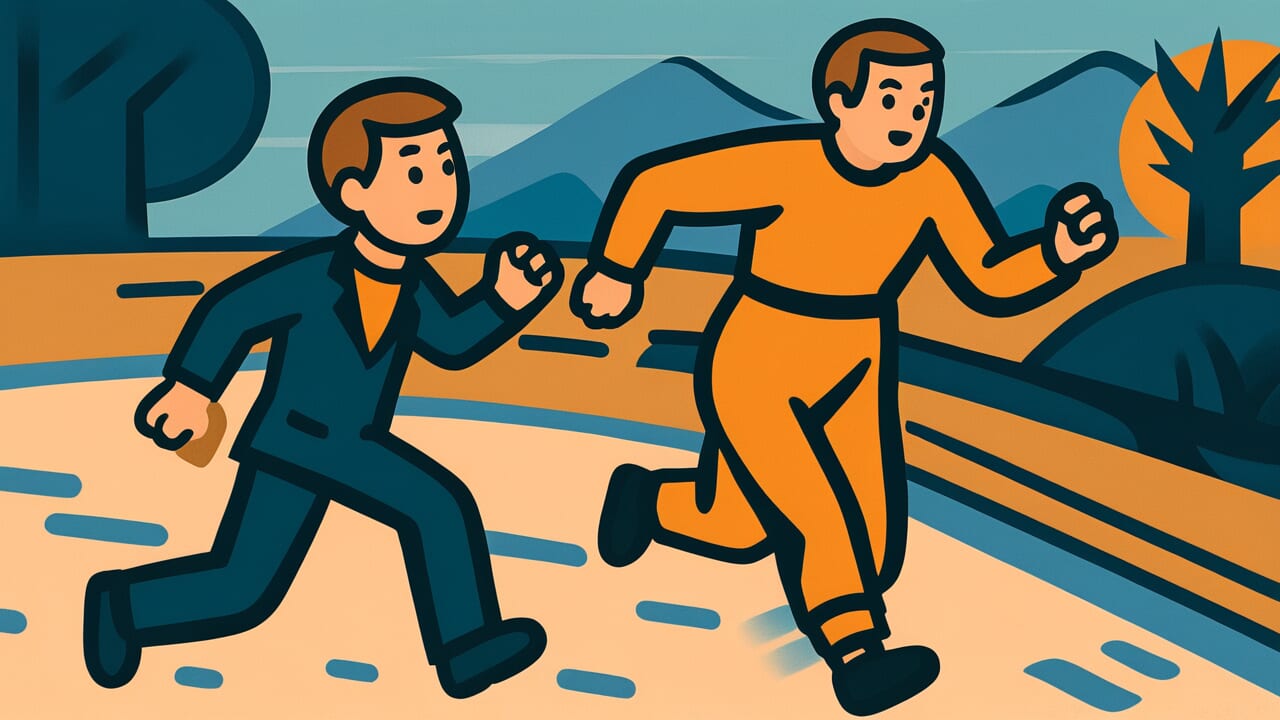How to Read “One who flees is a strong person”
Niguru o ba gō no mono
Meaning of “One who flees is a strong person”
This proverb means that fleeing can sometimes be a courageous action. What looks like cowardly “running away” actually requires calm judgment and true courage.
Recklessly standing your ground isn’t the only form of bravery. Fighting on in a losing situation can sometimes be just stubbornness or pride.
Truly strong people have the wisdom to know when to retreat. They pull back temporarily to preserve their life and strength, waiting for a better opportunity. This is real courage.
Today, this wisdom applies to many situations. Making the decision to withdraw from difficult circumstances, cutting your losses, or canceling a project all fit this principle.
People who have the courage to make the right call without fearing criticism for “running away” are truly strong.
Origin and Etymology
This proverb uses old Japanese expressions. “Niguru” is the classical form of “to flee,” “o ba” is an emphatic particle, and “gō no mono” means a courageous or strong person.
A direct translation would be “the one who flees is the courageous one.”
The exact first written source is unclear, but this saying likely comes from the samurai era. During the Warring States period, “retreat” and “rout” were completely different concepts on the battlefield.
Rather than charging recklessly to total defeat, calmly assessing the situation and temporarily withdrawing to fight another day actually required advanced judgment and courage.
What’s interesting is how this saying describes the seemingly negative act of “fleeing” with “gō,” the most positive word for strength.
Japanese bushido valued honor and reputation highly. But it also respected practical judgment. Alongside the idea of “never suffering the shame of capture alive,” there coexisted realistic wisdom like “losing is winning” and “of the thirty-six strategies, fleeing is best.”
This proverb shows the deep insight of ancestors who understood the difference between superficial bravery and true courage.
Usage Examples
- This project will only cause deeper wounds if we continue. One who flees is a strong person, so let’s make the decision to withdraw now.
- He quit the company no matter what others said. One who flees is a strong person—he had the courage to protect his own life.
Universal Wisdom
Humans have a strong belief that “pulling back means losing.” This is deeply rooted in our instincts.
Even in the animal world, turning your back and fleeing marks you as weak. That’s why people unconsciously feel pressure to “fight to the end.”
But this proverb has been passed down for hundreds of years because humans aren’t creatures driven by instinct alone. We have reason and the power to predict the future.
We possess the intelligence to understand that today’s retreat can lead to tomorrow’s victory.
What’s interesting is that this wisdom is most needed precisely when you feel you “can’t back down.” When you’ve already invested so much, when you worry about others’ opinions, when your pride is at stake.
These are the moments when people lose calm judgment. Emotion clouds reason, and you cling to wishful thinking that “just a little more effort will work.”
This proverb sees through this human weakness and boldly declares “fleeing is courage.” True strength means being able to make the right decision despite your emotions and outside pressure.
This is a deep truth about human nature that doesn’t change with time.
When AI Hears This
Mathematically speaking, the choice to flee is actually the result of calculating all future possibilities. In game theory, there’s a concept called “backward induction” where you work backward from the final position to choose the optimal move.
For example, if a chess AI determines that attacking now has a high probability of checkmate in three moves, it deliberately pulls back its pieces.
To human eyes it looks like “fleeing,” but the AI has already calculated win rates twenty moves ahead.
What’s crucial in this judgment is information asymmetry. The fleeing side has insight into the opponent’s strength and behavior patterns, but the opponent doesn’t know the true reason for the retreat.
This information gap creates strategic advantage. Research on professional chess players shows that stronger players make “retreat decisions” faster and more accurately, choosing to pull back about 40 percent more often than weaker players on average.
Even more interesting is how fleeing gives your opponent the option to “pursue,” dispersing their resources. Military simulations report cases where planned retreats stretch enemy supply lines and improve win rates by up to 30 percent.
In other words, fleeing is an advanced tactical maneuver that forces the opponent’s next move. Courage isn’t about charging forward—it’s the calculation ability to calmly choose the best move.
Lessons for Today
Modern society may place too much value on “continuing to work hard.” On social media, success stories stand out while withdrawals and course changes are treated as failures.
But your life is yours. You don’t need to keep pushing yourself for others’ approval.
This proverb teaches us to redefine “courage.” True courage means making the right choice for yourself without worrying about others’ opinions.
The courage to quit a toxic workplace, to leave incompatible relationships, to give up a path that doesn’t suit you. These aren’t “running away”—they’re active choices to protect your life.
What matters is that pulling back is different from giving up. Temporary retreat is for waiting for better opportunities, building strength, and exploring different paths.
It’s not an ending but a preparation period for a new beginning.
If you feel like “running away” from something right now, that might not be weakness. Rather, the reason within you might be showing you the right path.



Comments